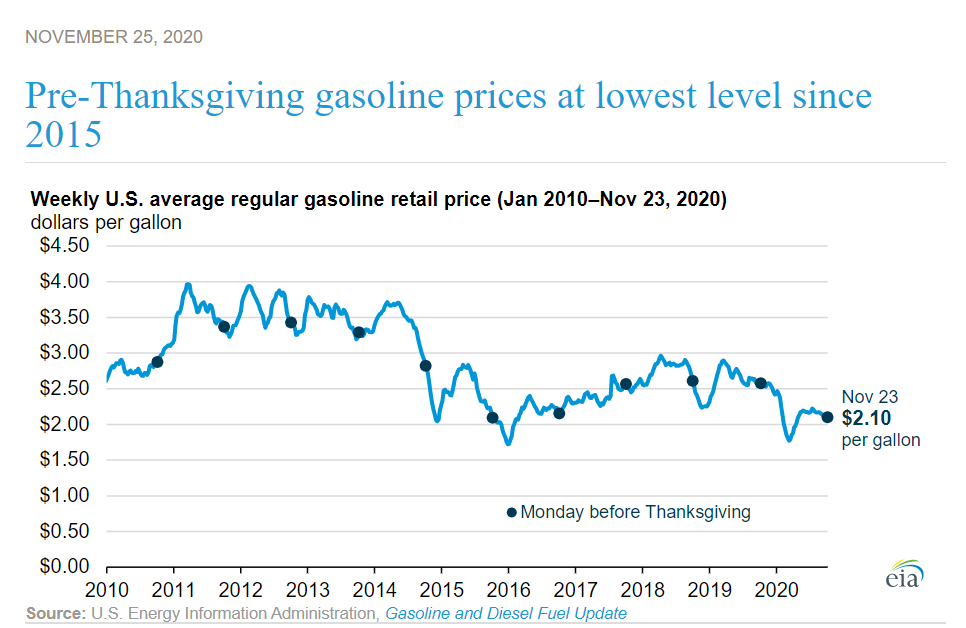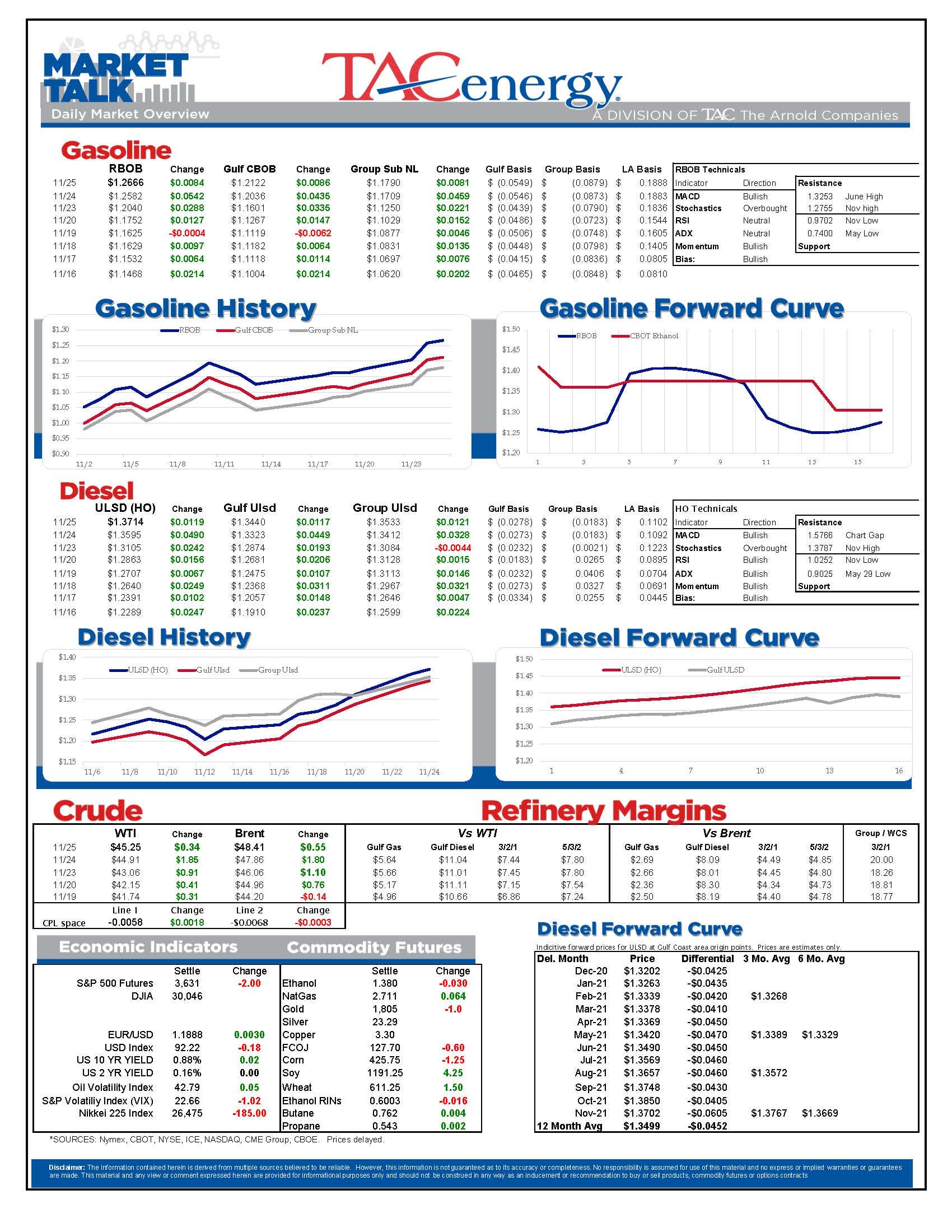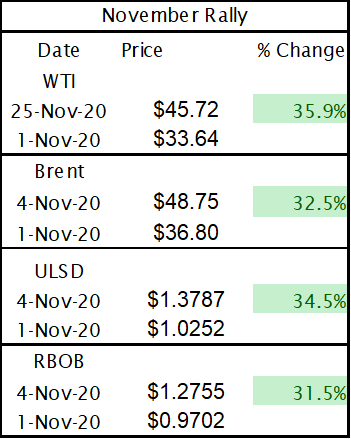Oil And Diesel Prices Hitting Fresh 8 Month Highs

Oil and diesel prices are hitting fresh 8 month highs this morning and the big 4 petroleum futures contracts are now each up more than 30% from the lows set November 1st with a variety of technical and fundamental factors contributing to the surge.
The DJIA breaching 30,000 seems to be giving plenty of sentimental boost as investors are taking a risk-on stance, and there is clear technical momentum now that the top end of the long-lasting sideways trading range has finally broken.
Perhaps most notable on the charts is that ULSD futures finally filled the gap in their chart left behind during the March collapse. There’s still another 20 cents of upside for distillates to reach their March highs, but short term warning signals are suggesting the contract is overbought following an 8 day streak of gains, and due for a corrective pull back in the near future.
Expectations that OPEC & Friends will be forced to extend output cuts, and another missile strike on Saudi Arabian energy infrastructure are both getting credit for the fundamental reasoning for this rally. The good news is the Saudi facility suffered minimal damage from the missile that was reportedly able to travel more than 300 miles through the air, but was apparently unable to break through the outer wall of a diesel storage tank.
The API was said to show builds in crude oil and gasoline inventories last week of 3.8 and 1.3 million barrels respectively, while distillates drew by 1.8 million barrels. The builds in inventory were getting credit for a pause in the rally overnight, but seem to be ignored now that the buyers have stepped back in. The DOE/EIA’s weekly status report is due out at its normal time this morning.
An EIA note this morning shows US gasoline prices are holding near their lowest in 10 years heading into what is traditionally the busiest travel day of the year. The note also highlights the expected reductions in travel this Thanksgiving holiday by car (4%) air (48%) and mass transit (76%) due to COVID.
That huge difference between automobiles (which primarily run on gasoline) and other transportation methods (which rely heavy on various distillates) is one of many challenges refiners are facing as they attempt to shift output to match the unprecedented changes in demand this year.
Speaking of which, there was yet another refining casualty this week as Total announced it was halting operations the Donges refinery in Western France due to poor economic conditions. The shutdown is expected to last several months, but the plant is moving forward with a major upgrading project suggesting that it could return to service once demand gets back to normal.
NYMEX contracts will trade Thursday and Friday, but only Friday’s trading will have a settlement. Spot markets will not be assessed either day, so most rack prices will carry through from tonight to Monday.
Click here to download a PDF of today’s TACenergy Market Talk.
Latest Posts
Week 15 - US DOE Inventory Recap
Prices To Lease Space On Colonial’s Main Gasoline Line Continue To Rally This Week
Equity Markets Have Been Pulling Back Sharply In Recent Days As Inflation And Trade Concerns Inject A Sense Of Reality Into Stocks
Gasoline And Crude Oil Prices Reached Fresh Multi-Month Highs Friday Morning As News Of The Anticipated Attacks Spread
Social Media
News & Views
View All
Week 15 - US DOE Inventory Recap

Prices To Lease Space On Colonial’s Main Gasoline Line Continue To Rally This Week
Energy markets are sliding lower again to start Wednesday’s trading as demand concerns and weaker stock markets around the world seem to be outweighing any supply concerns for the time being.
Rumors continue to swirl about an “imminent” response by Israel to Iran’s attacks, but so far, no news seems to be taken as good news in the hopes that further escalation can be avoided, even as tensions near the Red Sea and Strait of Hormuz continue to simmer.
Prices to lease space on Colonial’s main gasoline line continue to rally this week, trading north of 11 cents/gallon as Gulf Coast producers still struggle to find outlets for their production, despite a healthy export market. Gulf Coast CBOB is trading at discounts of around 34 cents to futures, while Gulf Coast RBOB is trading around a 16-cent discount, which gives shippers room to pay up for the linespace and still deliver into the East Coast markets at a profit.
Back to reality, or just the start of more volatility? California CARBOB basis values have dropped back to “only” 40 cent premiums to RBOB futures this week, as multiple flaring events at California refineries don’t appear to have impacted supply. The state has been an island for fuel supplies for many years as its boutique grades prevent imports from neighboring states, and now add the conversion of the P66 Rodeo refinery to renewable diesel production and the pending changes to try and cap refinery profits, and it’s easier to understand why these markets are increasingly vulnerable to supply shocks and price spikes on gasoline.
RIN prices continue to fall this week, touching 44 cents/RIN for D4 and D6 values Tuesday, their lowest level in 6 weeks and just about a nickel above a 4-year low. While the sharp drop in RIN and LCFS values has caused several biodiesel and Renewable Diesel producers to either shut down or limit production, the growth in RIN generation continues thanks to projects like the Rodeo refinery conversion, making the supply in RINs still outpace the demand set by the Renewable Fuel Standard by a wide margin.
The API reported draws in refined products, 2.5 million barrels for gasoline and 427,000 barrels for distillates, while crude oil stocks had an estimated build of more than 4 million barrels. The DOE’s weekly report is due out at its normal time this morning.
Click here to download a PDF of today's TACenergy Market Talk.

Equity Markets Have Been Pulling Back Sharply In Recent Days As Inflation And Trade Concerns Inject A Sense Of Reality Into Stocks
It’s a mixed bag for energy markets to start Tuesday’s session with gasoline prices holding small gains, while oil and diesel prices show small losses as the world anxiously debates what comes next in the conflict, we’re still hoping we don’t have to call a war in the Middle East.
An early sell-off picked up steam Monday morning with refined products down more than a nickel for a few minutes, before reports that Israel was vowing to respond to Iran’s attack seemed to encourage buyers step back in an erase most of the losses for the day.
Equity markets have been pulling back sharply in recent days as inflation and trade concerns inject a sense of reality into stocks that had been flying high earlier in the year. The correlation between gasoline and crude oil prices had been fairly strong for the past couple of months but has since weakened as the weakness in stocks hasn’t yet trickled over into the energy arena. Both asset classes are seeing a tick higher in their volatility (aka Fear) indices this week however, and when fear starts driving the trade, we often see these prices move together.
Diesel has been underperforming the rest of the energy complex for most of the year so far, and those hoping for lower diesel prices got more good news when the Dangote refinery in Nigeria began loading diesel for domestic use Monday, in the latest milestone for the giant project that will have a major influence on Atlantic basin supply. Naturally, local lawmakers are already complaining that the refinery’s prices are too high.
The EIA this morning highlighted the record amount of crude oil China imported in 2023 after reopening the country post-COVID and after completing numerous new refinery builds in the past few years. Russia accounted for the largest increase in shipments to China last year, as China is one of the few countries that doesn’t mind ignoring sanctions. Speaking of which, the US House is expected to take up a new vote this week on sanctioning Chinese imports of Iranian crude, which the EIA notes are often hidden by relabeling the crude to make it appear as if it originated in Malaysia, Oman or the UAE.
We’re just 2 weeks away from the startup of Canada’s long-awaited Transmountain pipeline expansion that will bring roughly 600,000 barrels/day of capacity to the Pacific basin. That new outlet is great news for Canadian producers long restricted by takeaway capacity, and bad news for Midcontinent refiners who have grown accustomed to the discounted Canadian grades. A Bloomberg article Monday noted that Iraq’s Basrah Heavy crude is most likely to be displaced by West Coast US refiners who can now buy much closer to home.
Click here to download a PDF of today's TACenergy Market Talk.


